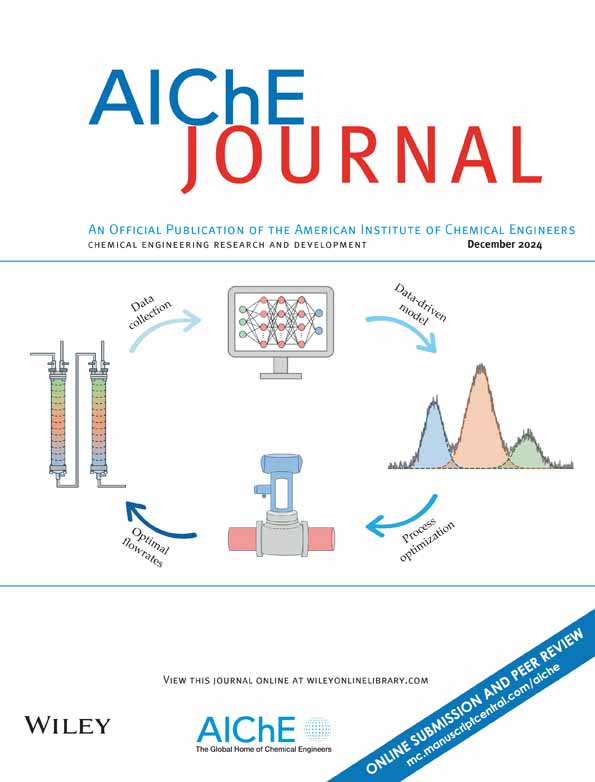CO2 capture with hydrophobic halogen-free natural deep eutectic solvents: Perturbed-Chain Statistical Associating Fluid Theory modeling and molecular insights
IF 3.5
3区 工程技术
Q2 ENGINEERING, CHEMICAL
引用次数: 0
Abstract
This work systematically investigates CO2 capture with hydrophobic halogen-free natural deep eutectic solvents (NADES) as absorbents from both thermodynamic and molecular perspectives. A series of NADES consisting of decanoic acid, menthol, thymol, and lidocaine as hydrogen bond acceptors/donors (HBAs/HBDs) were prepared, and the CO2 solubility in them was determined experimentally. Perturbed-Chain Statistical Associating Fluid Theory has been first extended to simultaneously predict the thermodynamic properties (i.e., Henry's constants, enthalpy change, Gibbs free energy change and entropy change for CO2 absorption in NADESs) as well as viscosity by combining with entropy scaling theory. Molecular insights into the structure–property relationship between different HBA/HBD structures and CO2 solubility were revealed by quantum chemical calculations and molecular dynamics simulations. This work provides theoretical guidance for the development and screening of novel NADES for efficient CO capture.二氧化碳捕获与疏水无卤天然深共晶溶剂:扰动链统计关联流体理论建模和分子见解
本研究从热力学和分子的角度系统地研究了疏水无卤天然深共晶溶剂(NADES)作为吸附剂的CO2捕获。制备了由癸酸、薄荷醇、百里香酚和利多卡因作为氢键受体/给体(HBAs/HBDs)的一系列NADES,并通过实验测定了它们在其中的CO2溶解度。微动链统计关联流体理论首次被扩展到结合熵标度理论同时预测热力学性质(即NADESs中CO2吸收的亨利常数、焓变、吉布斯自由能和熵变)和粘度。通过量子化学计算和分子动力学模拟揭示了不同HBA/HBD结构与CO2溶解度之间的结构-性质关系。该研究为新型NADES高效捕集CO的开发和筛选提供了理论指导。
本文章由计算机程序翻译,如有差异,请以英文原文为准。
求助全文
约1分钟内获得全文
求助全文
来源期刊

AIChE Journal
工程技术-工程:化工
CiteScore
7.10
自引率
10.80%
发文量
411
审稿时长
3.6 months
期刊介绍:
The AIChE Journal is the premier research monthly in chemical engineering and related fields. This peer-reviewed and broad-based journal reports on the most important and latest technological advances in core areas of chemical engineering as well as in other relevant engineering disciplines. To keep abreast with the progressive outlook of the profession, the Journal has been expanding the scope of its editorial contents to include such fast developing areas as biotechnology, electrochemical engineering, and environmental engineering.
The AIChE Journal is indeed the global communications vehicle for the world-renowned researchers to exchange top-notch research findings with one another. Subscribing to the AIChE Journal is like having immediate access to nine topical journals in the field.
Articles are categorized according to the following topical areas:
Biomolecular Engineering, Bioengineering, Biochemicals, Biofuels, and Food
Inorganic Materials: Synthesis and Processing
Particle Technology and Fluidization
Process Systems Engineering
Reaction Engineering, Kinetics and Catalysis
Separations: Materials, Devices and Processes
Soft Materials: Synthesis, Processing and Products
Thermodynamics and Molecular-Scale Phenomena
Transport Phenomena and Fluid Mechanics.
 求助内容:
求助内容: 应助结果提醒方式:
应助结果提醒方式:


